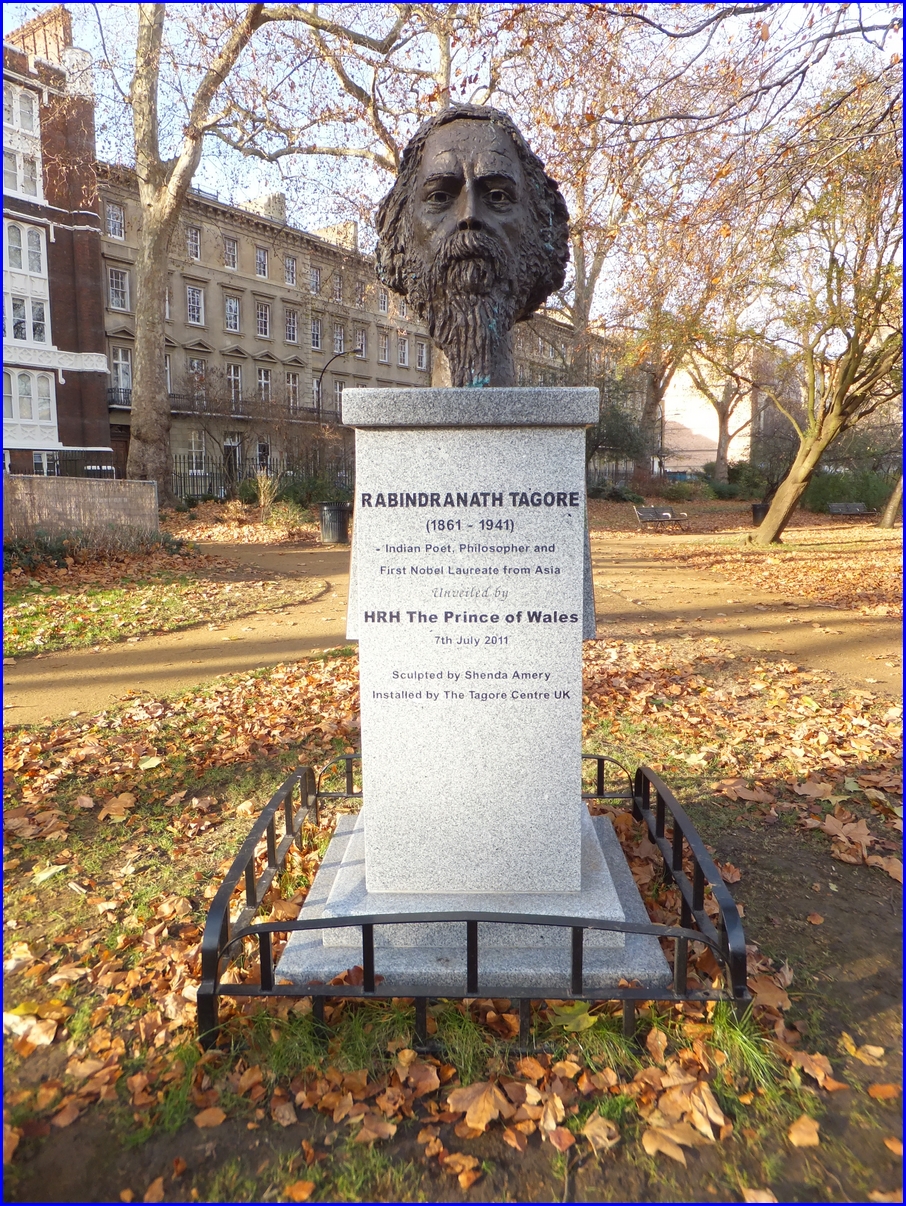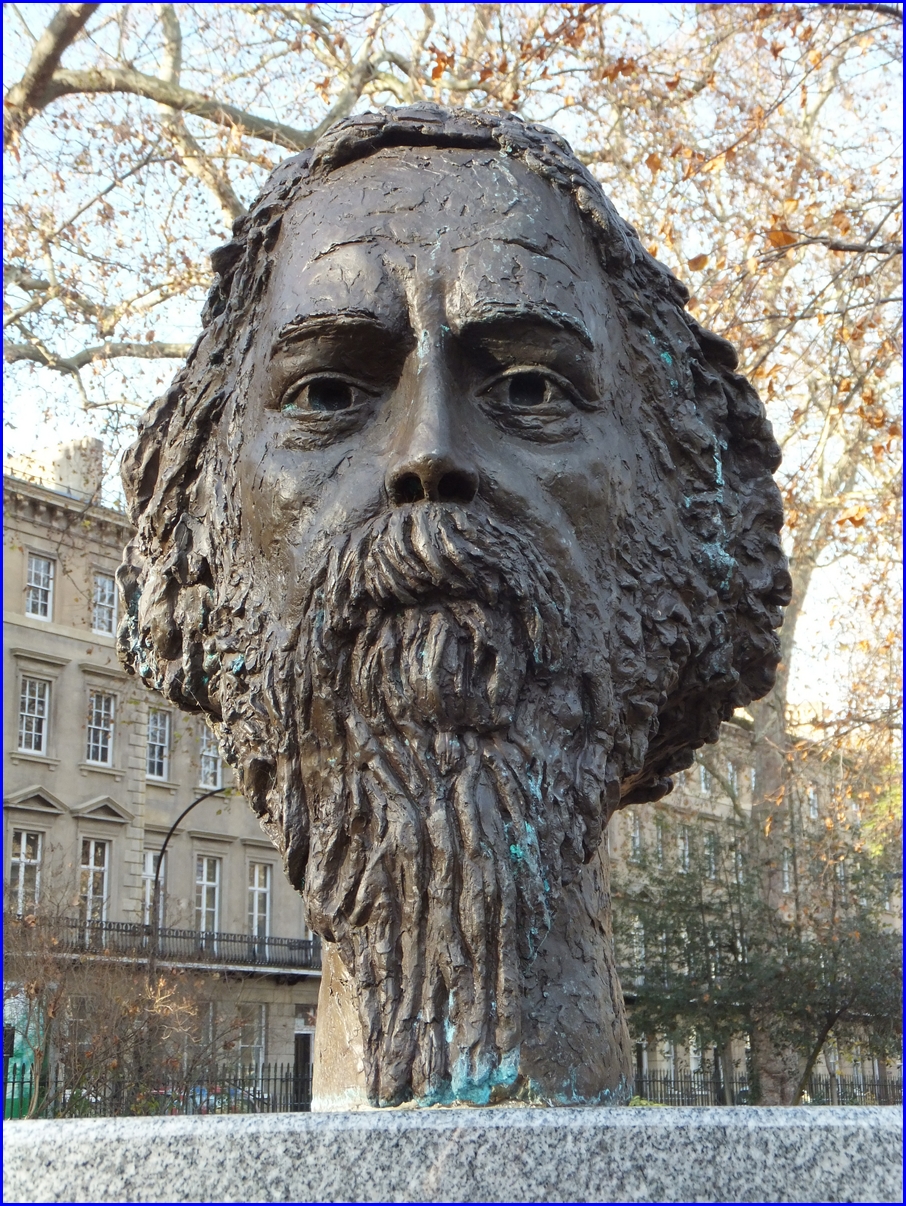
Rabindranath Tagore Bust - Gordon Square, London, UK
N 51° 31.442 W 000° 07.856
30U E 699026 N 5712004
This bronze bust of Indian poet Rabindranath Tagore, the first Nobel Laureate from Asia, is mounted on a granite plinth in Gordon Square in London. The bust was unveiled by Prince Charles on 7th July 2011, an event that made the news.
Waymark Code: WMMVE7
Location: London, United Kingdom
Date Posted: 11/08/2014
Views: 3
The BBC website tells us about the event:
A bust of Nobel Prize-winning Indian poet Rabindranath Tagore has been unveiled in London by Prince Charles.
Tagore was the first Asian to win the award, in 1913, which was for his collection of poems titled Gitanjali.
Unveiling the £50,000 bronze statue in Gordon Square, central London, to mark the poet's 150th birth year, Prince Charles said the inscriptions will "shine out as a beacon of tolerance".
Tagore Centre UK said it hoped to raise £15,000 towards the cost of the statue.
The sculpture, by Shenda Armery, is located close to Tavistock Square where six years ago one of four suicide bombers detonated a bomb in a bus.
Unveiling the bust on the anniversary of 7 July bombings, in which 52 people were killed, Prince Charles said the date "marks a dark anniversary".
"From this darkness, perpetuated only a stone's throw away from here, the inscriptions on this bust will shine out as a beacon of tolerance, understanding and of unity in diversity," he added.
The Nobel Prize medal awarded to Tagore for literature was stolen along with some of his other personal possessions from a museum in the east Indian state of West Bengal in March 2004.
Sweden's Nobel Foundation replaced the stolen medal with two replicas in December that year.
The bust, that is cast from bronze and is larger than life-size, was sculpted by Shenda Amery. Photos of Tagore indicate that the bust is a good likeness.
The inscription, on the front of the plinth, tells us:
Rabindranath Tagore
(1861 - 1941)
Indian poet, philosopher and
First Nobel Laureate from Asia
Unveiled by
HRH The Prince of Wales
7 July 2011
Sculpted by Shenda Amery
Installed by the Tagore Centre UK
Plaques on either side of the plinth contain an extract from one of his works in both English and his mother tongue.
The Nobel Prize website tells us about Traore:
 Rabindranath Tagore (1861-1941) was the youngest son of Debendranath Tagore, a leader of the Brahmo Samaj, which was a new religious sect in nineteenth-century Bengal and which attempted a revival of the ultimate monistic basis of Hinduism as laid down in the Upanishads. He was educated at home; and although at seventeen he was sent to England for formal schooling, he did not finish his studies there. In his mature years, in addition to his many-sided literary activities, he managed the family estates, a project which brought him into close touch with common humanity and increased his interest in social reforms. He also started an experimental school at Shantiniketan where he tried his Upanishadic ideals of education. From time to time he participated in the Indian nationalist movement, though in his own non-sentimental and visionary way; and Gandhi, the political father of modern India, was his devoted friend. Tagore was knighted by the ruling British Government in 1915, but within a few years he resigned the honour as a protest against British policies in India.
Rabindranath Tagore (1861-1941) was the youngest son of Debendranath Tagore, a leader of the Brahmo Samaj, which was a new religious sect in nineteenth-century Bengal and which attempted a revival of the ultimate monistic basis of Hinduism as laid down in the Upanishads. He was educated at home; and although at seventeen he was sent to England for formal schooling, he did not finish his studies there. In his mature years, in addition to his many-sided literary activities, he managed the family estates, a project which brought him into close touch with common humanity and increased his interest in social reforms. He also started an experimental school at Shantiniketan where he tried his Upanishadic ideals of education. From time to time he participated in the Indian nationalist movement, though in his own non-sentimental and visionary way; and Gandhi, the political father of modern India, was his devoted friend. Tagore was knighted by the ruling British Government in 1915, but within a few years he resigned the honour as a protest against British policies in India.
Tagore had early success as a writer in his native Bengal. With his translations of some of his poems he became rapidly known in the West. In fact his fame attained a luminous height, taking him across continents on lecture tours and tours of friendship. For the world he became the voice of India's spiritual heritage; and for India, especially for Bengal, he became a great living institution.
 Although Tagore wrote successfully in all literary genres, he was first of all a poet. Among his fifty and odd volumes of poetry are Manasi (1890) [The Ideal One], Sonar Tari (1894) [The Golden Boat], Gitanjali (1910) [Song Offerings], Gitimalya (1914) [Wreath of Songs], and Balaka (1916) [The Flight of Cranes]. The English renderings of his poetry, which include The Gardener (1913), Fruit-Gathering (1916), and The Fugitive (1921), do not generally correspond to particular volumes in the original Bengali; and in spite of its title, Gitanjali: Song Offerings (1912), the most acclaimed of them, contains poems from other works besides its namesake. Tagore's major plays are Raja (1910) [The King of the Dark Chamber], Dakghar (1912) [The Post Office], Achalayatan (1912) [The Immovable], Muktadhara (1922) [The Waterfall], and Raktakaravi (1926) [Red Oleanders]. He is the author of several volumes of short stories and a number of novels, among them Gora (1910), Ghare-Baire (1916) [The Home and the World], and Yogayog (1929) [Crosscurrents]. Besides these, he wrote musical dramas, dance dramas, essays of all types, travel diaries, and two autobiographies, one in his middle years and the other shortly before his death in 1941. Tagore also left numerous drawings and paintings, and songs for which he wrote the music himself.
Although Tagore wrote successfully in all literary genres, he was first of all a poet. Among his fifty and odd volumes of poetry are Manasi (1890) [The Ideal One], Sonar Tari (1894) [The Golden Boat], Gitanjali (1910) [Song Offerings], Gitimalya (1914) [Wreath of Songs], and Balaka (1916) [The Flight of Cranes]. The English renderings of his poetry, which include The Gardener (1913), Fruit-Gathering (1916), and The Fugitive (1921), do not generally correspond to particular volumes in the original Bengali; and in spite of its title, Gitanjali: Song Offerings (1912), the most acclaimed of them, contains poems from other works besides its namesake. Tagore's major plays are Raja (1910) [The King of the Dark Chamber], Dakghar (1912) [The Post Office], Achalayatan (1912) [The Immovable], Muktadhara (1922) [The Waterfall], and Raktakaravi (1926) [Red Oleanders]. He is the author of several volumes of short stories and a number of novels, among them Gora (1910), Ghare-Baire (1916) [The Home and the World], and Yogayog (1929) [Crosscurrents]. Besides these, he wrote musical dramas, dance dramas, essays of all types, travel diaries, and two autobiographies, one in his middle years and the other shortly before his death in 1941. Tagore also left numerous drawings and paintings, and songs for which he wrote the music himself.